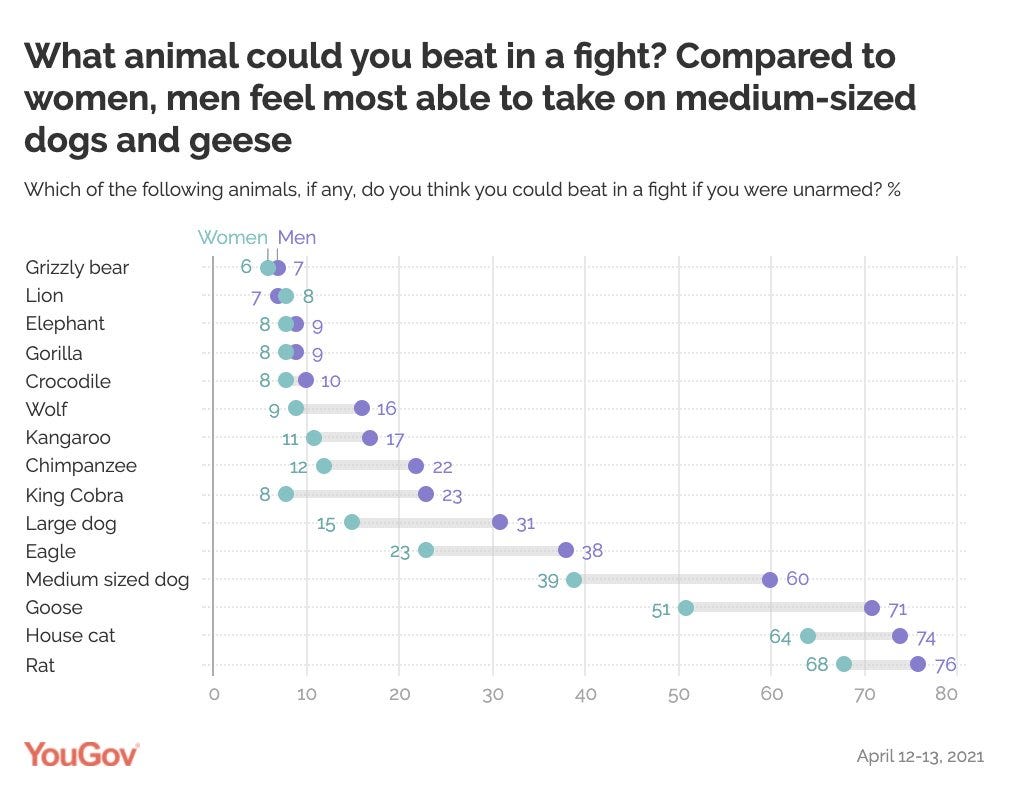Hello -
First, some housekeeping. This will be last Bluestocking for a little while, because I’m taking a break from it for June. So if you don’t receive a Friday newsletter, don’t worry, I ATEN’T DEAD.
Why the break? The last few months have brought a relentless drumbeat of low-level internet idiocy to my door—the final straw was discovering this week that some Peterson fans had snuck into my locked Instagram account, biding their time until the perfect moment to shout at me about what a bad journalist I am. Tedious. So I’m going to seize upon the easing of lockdown to see some 3D people and spend less time online. As a consolation, this is a Super Bonus Bumper Edition of the Bluestocking.
On a related note, I took part in a panel last week on “cancel culture” entitled “Can Truth Survive The New Journalism?” with Katie Herzog and Bari Weiss, and here is an edited version of the pious little intro I gave, pretty much addressed to myself to tell me to stop complaining about mean people on the internet. Enjoy.
I expect that we will talk a lot tonight about social media mobs, and “cancel culture”—both valid topics—but I want to put that discussion within the broader context.
The biggest threat to journalism right now is that reporting costs money. Submitting Freedom of Information Requests. Attending court cases. Talking to people. It’s skilled work. It’s labour-intensive work. And often the most obvious reward for it is that your findings become the subject of a huge amount of debate by other people, relying on the facts you’ve established.
If we’re going to talk about truth in journalism then we have to acknowledge that finding out the truth is expensive, and there are lots of corporations and individuals willing to spend large amounts of money to ensure we don’t get to the truth.
Look at Purdue Pharmaceuticals. It is more than 20 years since the company knew that its Oxycontin pills were easy to abuse, and were contributing to America’s prescription-drug crisis, and it has taken dogged reporters to uncover that. That is billionaires using their money to obscure the truth.
Look at Theranos, a multi-million pound company promising diagnostic tests with a simple pinprick—technology which would have ushered in a medical revolution. . . had it actually existed. That is millionaires using their money to obscure the truth.
Look at Catherine Belton’s book Putin’s People, which reported on the oligarchs who have carved up Russia’s wealth between them. She is being sued for libel personally in the claimant-friendly English courts. That is a clear example of billionaires using their money to obscure the truth.
Look at Viktor Orban forcing a university out of Hungary for being too “western”. Look at the Chinese Communist Party preventing journalists from accessing Xinjiang and seeing its attempts to wipe out the culture of the Uighurs, a Muslim minority. Look at local newspapers, in both Britain and America, which can’t hold local politicians to account because they have been hollowed out by asset-strippers and by the way advertising revenue has moved to Google and Facebook.
So yes—I hate being ostracised for holding perfectly mainstream views as much as the next panellist, but that’s only one small part of the big picture here. I’m not going to be killed for my views. I’m probably not even going to be bankrupted for my views. The reason we need journalism isn’t because of some abstract concept of “truth,” but because without journalism, people—often very rich people—do bad stuff and get away with it. Everyone is entitled to their opinion, but in today’s media ecosystem: who can afford to establish the facts?
The Mystery of the World’s Greatest Card Trick (New York Times)
The trick is a version of a classic plot of magic, called Any Card at Any Number. These tricks are called ACAAN in the business. . . . For all their differences, every ACAAN has one feature in common: At some point, the magician touches the cards. The touch might be imperceptible, it might appear entirely innocent. But the cards are always touched.
With one exception: David Berglas’s ACAAN. He would place the cards on a table and he didn’t handle them again until after the revelation and during the applause. There was no sleight of hand, no hint of shenanigans. It was both effortless and boggling.
I love stories about magic, because they’re really stories about psychology, and stories about stories. (See also: Teller’s Rose, and the lead piece in David Grann’s collection The Devil and Sherlock Holmes.)
Why People Feel Like Victims (Nautilus)
In 2020, researchers in Israel, led by Rahav Gabray, a doctor of psychology at Tel Aviv University, conducted a series of empirical studies to come up with an answer. They identify a negative personality trait they call TIV or Tendency toward Interpersonal Victimhood. People who score high on a TIV test have an “enduring feeling that the self is a victim in different kinds of interpersonal relationships,” they write.
The study of TIV is built around four pillars. The first pillar is a relentless need for one’s victimhood to be clearly and unequivocally acknowledged by both the offender and the society at large. The second is “moral elitism,” the conviction that the victim has the moral high ground, an “immaculate morality,” while “the other” is inherently immoral. The third pillar is a lack of empathy, especially an inability to see life from another perspective, with the result that the victim feels entitled to act selfishly in response. The fourth pillar is Rumination—a tendency to dwell on the details of an assault on self-esteem.
So I have this great headline in search of a piece to place it above: “The Internet is a Munchausen’s Machine.” There is something about online culture which either incentivises “i am a smol needy human” grifts, or removes the safeguards which stop them proliferating in real life. Or maybe both.
This Nautilus article provides an interesting frame by outlining a victim-playing personality type, and suggesting a link to childhood trauma or insecurity.
Department of Wait, That’s the DEFENCE Lawyer?
(via Talking Points Memo)
Eavesdropping on the Anti-Racist Dinner Parties (The Cut)
Race2Dinner participants sign up for something that promises to be painful, unsightly, and yet transformative, like a chemical peel for the soul. “Interested in hosting a dinner?” asks the Race2Dinner website in red text superimposed on a shattered china plate. “Click here to smash your white fragility.” Guests used to be asked to read White Fragility, but no more. For one thing, Rao said, “we definitely don’t want to put another dollar in Robin DiAngelo’s pocket.” For another, among prospective customers, pretty much everyone has already read it.
When they first started out, they charged $2,500 per dinner, to be covered by the host or divided among her guests.
“That’s peanuts,” Jackson told me when we spoke over Zoom. “People pay more than that to go to a yoga conference.”
I repeat my contention that one day I will write a play about this phenomenon. The details are so great, including the female-led company called “SheEO,” which surely just makes people sound like they’re doing a Sean Connery impression when they answer the phone.
In a crowded field, the best bit is that after the initial stories about Race2Dinner came out, its organisers signed a deal to write White Women: Everything You Already Know About Your Own Racism and How to Do Better. (Wait, if I already know it, why do I need the book?) “They also raised the fee for each dinner to $5,000.”
Department of Dude, No
Come at me, medium-sized dog!*
*anything smaller than a golden retriever
Quick Links
“It’s both amusing and dismaying that the publishing insiders I speak to all seem to identify their archetypal reader as a 28-year-old white woman who grew up in Buckinghamshire or Oxfordshire.” (Johanna Thomas-Corr, The Observer)
The Atlantic has started publishing short stories again. I enjoyed this one, “Bump,” about a fake pregnancy bump.
“The element of this story that interests me most is how the beating heart of nerdy, liberal fact-mastery can pump blood into wild social media conspiracy, and send all these smart people down the sort of rabbit hole that leads other groups of Americans to believe that children are being transported inside refrigerators.” Ben Smith in the NYT on the Facebook group for previous Jeopardy! contestants, which became convinced a guy had done a white power hand signal on Jeopardy!
“There is a problem with all this, though, which is that we know what Cummings would have done if he’d been in charge, because we know what he did. He didn’t spend the start of the year trying to wake a sleeping government to the dangers of the virus. He spent it getting Sajid Javid fired as Chancellor of the Exchequer, because he wanted more control over other special advisers.” Rob Hutton on the bizarre spectacle of Dominic Cummings trying to rewrite 2020. (The Critic)
“What Harry represents is the presumption of the unassailability of that comes with confession. Your pain is put out for public consumption but not public debate. Because what monster would debate your pain?” (Hugo Rifkind, The Times)
“At the beginning of the year, the media didn’t want to look panicky, it didn’t want to look weird, so too many of us said things like “don’t worry about coronavirus, worry about the flu” or made fun of Silicon Valley types for refusing to shake hands.” Tom Chivers on the problem with “reading the room” when the room is wrong (Unherd).
“You scooped the bit of Einstein’s brain out of the jar and shook off the excess formaldehyde; then, you put some salt in the crook of your thumb and licked it, after which you took down a shot of cheap room-temperature tequila and sucked on the brain-bit until your mouth went numb.” (Bookforum)
For anyone who got a bit freaked out during Dominic Cummings’s testimony about solar flares, maybe don’t read this paper on “black sky events.”
The native scholar who wasn’t (NYT). Funnily enough, I didn’t include this woman in my “Identity Hoaxers” piece because I thought the case was too old and well-known.
Mitford Bonus Content of the Week
A Dinky sighting! Also, Decca’s son lives in Coventry!
That’s all for now. Buy my book, look after yourself, and see you soon.









